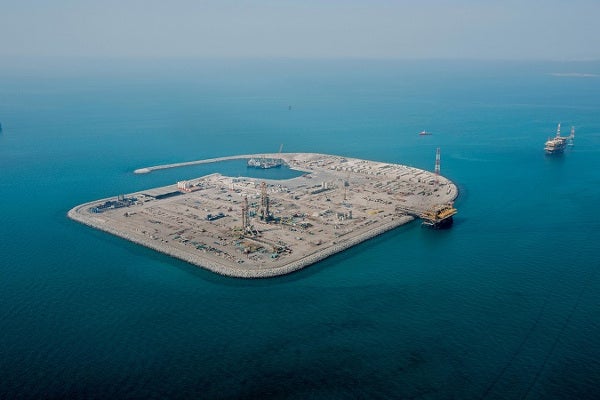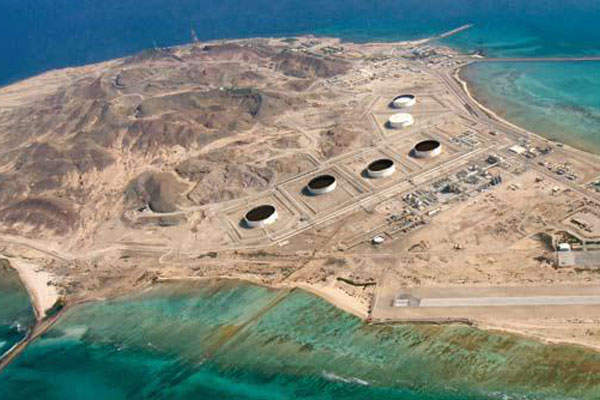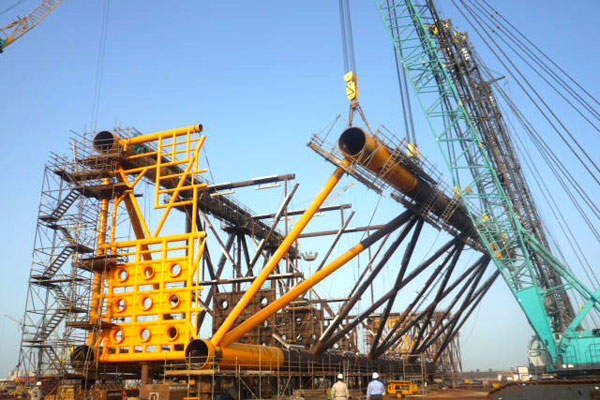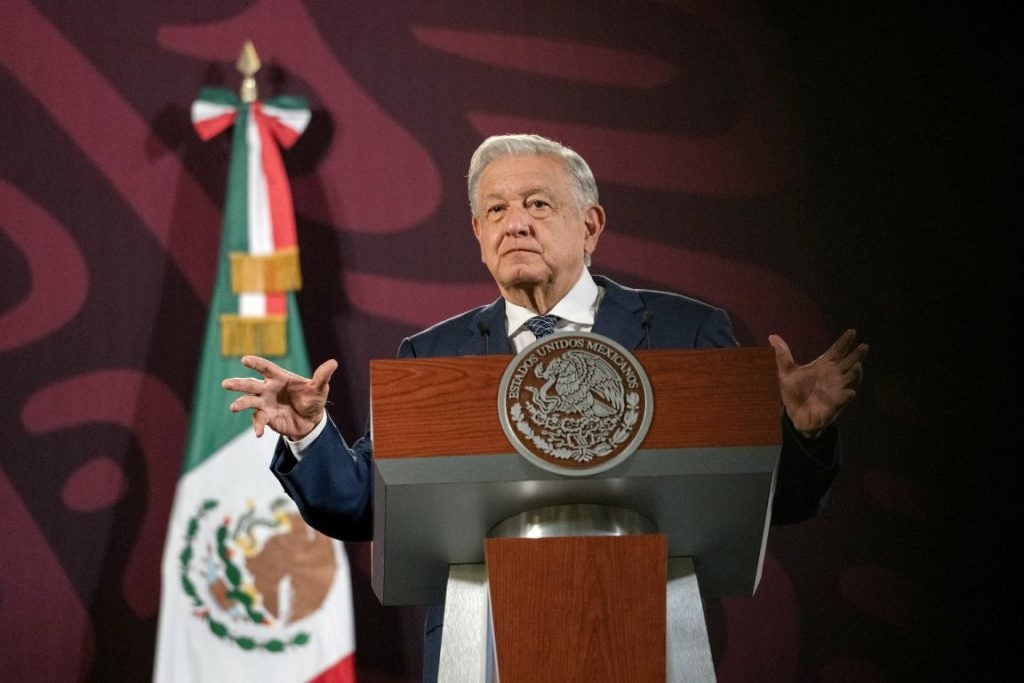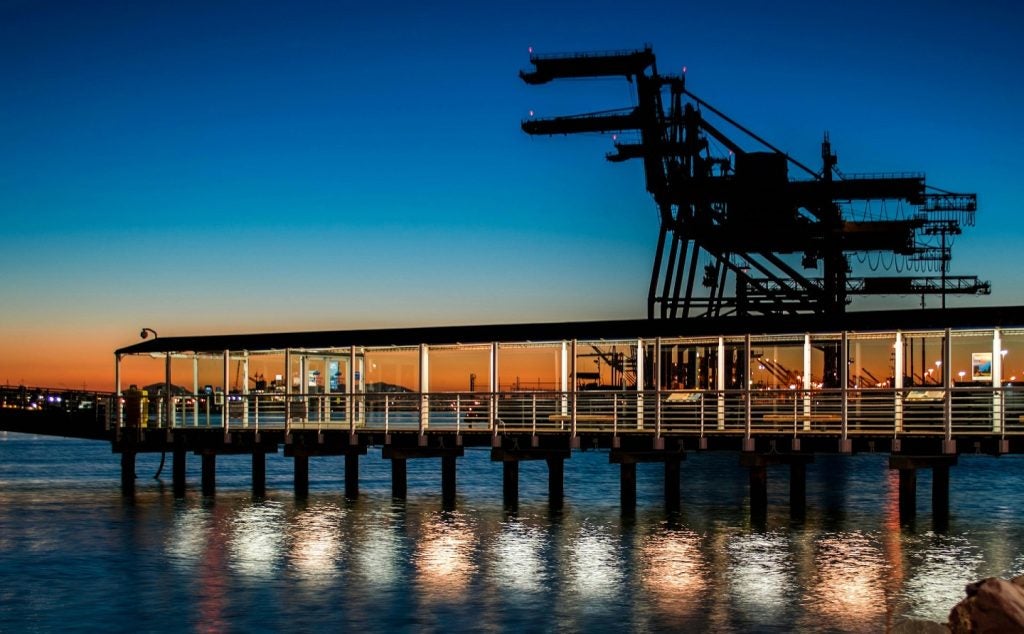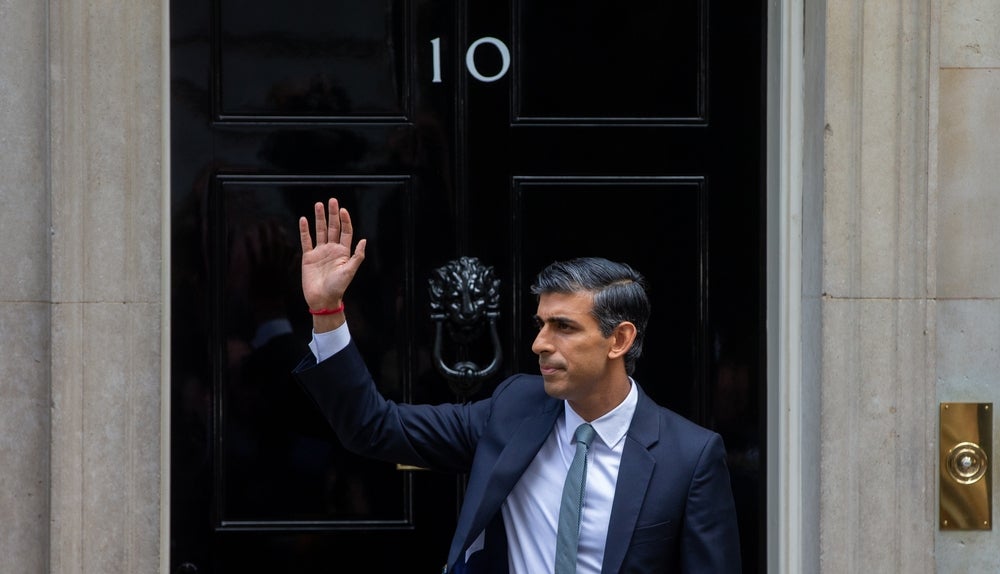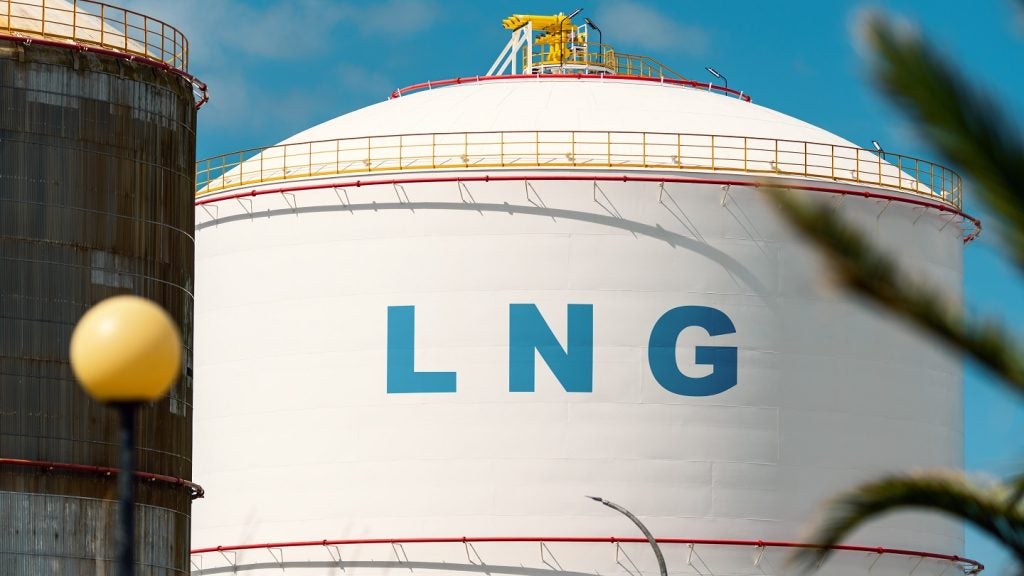Located approximately 84km north-west of the Abu Dhabi islands, the Upper Zakum oilfield has estimated reserves of 50 billion barrels of oil.
Upper Zakum is the second-largest offshore oilfield, as well as the fourth-largest oilfield, in the world. It is owned by the Zakum Development Company (ZADCO), a joint venture (JV) of ADNOC (60%), which acts as the operator, ExxonMobil (28%) and the Japan Oil Development Company (JODCO, 12%), a wholly-owned subsidiary of INPEX.
Following the completion of the UZ750 Project, which had an investment of approximately $10bn, the production capacity of the field increased from 500,000bpd to 750,000bpd, enabling the field to be sustainable for 25 years.
In November 2017, partners of the Upper Zakum field announced an agreement to increase production capacity to one million barrels per day by 2024 with an investment of more than $30bn.
In July 2021, ADNOC announced an investment of AED2.8bn ($763.7m) to deploy integrated rigless services across the six artificial islands of the Upper Zakum and Satah Al Razboot (SARB) fields to boost production capacity to five million barrels per day by 2030.
Location and reserves
The Upper Zakum oilfield is located approximately 84km north-west of the Abu Dhabi islands. The shallow-water Upper Zakum oilfield covers an area of 1,200km².
Details of the Upper Zakum oilfield
The presence of oil in the field was discovered in 1963, and the decision to develop the field was made in 1977. Production from the oilfield began in 1982. ADNOC partnered with JODCO in 1978 for the development of the field, followed by Exxon in 2006.
A study to increase production capacity from 500,000bpd to 750,000bpd also commenced in 2006, which resulted in an artificial island-based development.
The shallow-water Upper Zakum oilfield comprises approximately 450 wells, extending 7,000ft to 8,000ft below the earth’s surface. The wells are tied to more than 90 existing platforms.
Oil retrieved from the field flows through a pipeline network into one of four main processing facilities for treatment. It is then pumped through the main oil lines, which measure approximately 55km, to Zirku Island for further processing, storage and export.
Details of the UZ750 Project at Upper Zakum
The UZ750 project involved the construction of four artificial islands, comprising a central complex housing the processing facilities as well as the north, south and west satellite platforms.
The first phase of the project involved the development of the offshore facilities. It included the laying of 240km of subsea pipelines, 128km of subsea composite and fibre-optic cables, and the installation of 30,000t of offshore structures, such as jackets, riser platforms, flare towers and bridges, as well as approximately 3,000t of island modules and bridges.
Phase two involved the development of facilities on the four artificial islands, including wellhead controls, manifolds, crude oil process facilities, water injection and gas lift, booster gas compression facilities, oil export pumps, power generation, and ancillary utilities, as well as the modification of the existing facilities. The second phase involved as many as 22 production modules, comprising a wellhead control and oil processing unit.
The project also involved the construction of accommodation facilities for 2,150 people, alongside supporting buildings and permanent utilities, such as recreational areas, a mosque, and operations and drilling offices.
In 2019, a well was drilled with a depth of more than 40,000ft, which is the longest well ever drilled in the Middle East.
Development of man-made islands at Upper Zakum
Located north-west of the Abu Dhabi islands, the man-made islands were developed using new technologies, including the extended reach drilling (ERD) technology, which enables wells to be drilled vertically in the initial stages. After this, they can be drilled horizontally to target reservoirs several miles away.
Another innovative technology used was the maximum reservoir contact (MRC), which reduces the number of necessary new wells and unlocks tighter areas in reservoirs.
The four islands, which are oval-shaped and measure 2,000ft to 2,600ft in diameter, were constructed from sand and rock. The rocks were transported to the site from quarries in the UAE. The islands were constructed in water depths ranging between 5m and 15m.
Construction works for the islands involved 20 million cubic metres of dredging and levelling, as well as 20 million cubic metres of ground amelioration. Seven million tonnes of stones, artificial fabrics and concrete units were used for beach protection. The civil works for the four artificial islands were completed in 2015.
Upper Zakum field development contractors
In July 2021, the contract for integrated rigless services on the Upper Zakum and SARB fields was awarded in the form of three contracts to oilfield services company Schlumberger, drilling company ADNOC Drilling and Halliburton, a provider of products and services for the energy industry.
The value of the contract is divided among the three companies, with $381.18m going to Schlumberger, $228.71m to ADNOC Drilling and $153.87m to Halliburton.
The National Petroleum Construction Company (NPCC), an engineering, procurement and construction (EPC) contractor, and TechnipFMC, a provider of project management, engineering and construction services, carried out the first phase of the UZ750 project under an AED3bn ($817m) contract.
TechnipFMC provided conceptual engineering and front-end engineering design for the process units on the islands, including several other facilities.
Engineering and project management company Amec Foster Wheeler provided project management consultancy (PMC) services for the offshore elements of the project under a $75m contract, while COWI carried out PMC services for the construction of the islands.
Amec Foster Wheeler won an extension to its existing PMC contract in August 2015.
John Wood Group, an engineering and consulting company, acquired Amec Foster Wheeler in October 2017. In November 2018, John Wood Group received a one-year contract extension to provide PMC services for the UZ750 project starting from January 2019.
Engineering and consultancy company Ramboll conducted the feasibility study for the artificial islands. The National Marine Dredging Company (NMDC), a dredging and marine civil construction services provider, was responsible for the construction of the islands.
Construction company BIC Contracting (BICC), previously Habtoor Leighton Group (HLG), won a contract for the construction of the accommodation and support facilities for the artificial islands in June 2012.
Core Emirates was subcontracted by BICC for the commissioning management of the accommodation modules.
Total Waste Management Alliance (TWMA), an engineering and environmental services provider, was contracted to design, commission and operate an advanced solids control and fluid recovery system for the project. Over the course of the project, it provided specialist drilling services that included the handling, transfer, storage and treatment of both oil-based and water-based drill cuttings.
Petrofac Emirates, a joint venture between Petrofac and Mubadala Petroleum, was awarded the contract for engineering, procurement, construction contract transportation and commissioning of island surface facilities (EPC-2) on the four artificial islands.
In consortium with shipbuilding and marine engineering company Daewoo Shipbuilding & Marine Engineering (DSME), Petrofac Emirates secured the $3.7bn contract in April 2013.
Petrofac delivered the first two modules for the UZ750 project in October 2015.
DSME sub-contracted Dyna-Mac, a hydrocarbon module manufacturing company, for the fabrication of 12 onshore modules, including major processing modules.
Engineering and construction company Técnicas Reunidas was awarded the front-end engineering and design contract for the one million barrels per day expansion project of the Upper Zakum field in 2019.
CoMarEng Advisory, an engineering consultancy company, was appointed as the project management consultant to ensure that the islands were designed and constructed according to the specifications and budget.
Control & Applications Emirates, an EPC contractor, was subcontracted by the Petrofac-DSME consortium for electrical and instrumentation works on the surface facilities of the artificial islands.
The ACCROPODE II technique, with assistance provided by Concrete Layer Innovations (CLI), was implemented to protect the northern and western islands.
Dimensional control and laser scanning survey services provider Scopus conducted dimensional surveys and build control services to enable the construction of 172 structures under phase two of the project.
Al Jaber Energy Services, an EPC contractor, was subcontracted by Petrofac to build the temporary facilities and site offices. NSCC International, an engineering and ground improvement works contractor, was subcontracted by Al Jaber to conduct ground improvement works.
Modular buildings solutions provider Specialist Services supplied its Local Equipment Rooms (LER) and Local Control Rooms (LCR) buildings for the project, while marine contracting company Abyss Maritime Solutions provided logistics and maritime support for the construction of utilities and other facilities on the artificial islands.
GE Oil & Gas, a division of GE and now part of Baker Hughes, supplied turnkey turbomachinery solutions, including six power generation modules for the project. Oil and gas equipment supplier Flenco Fluid System was subcontracted by GE to supply auxiliary systems.
Flow control solutions provider Orseal supplied manually operated and pneumatically actuated valves, while oilfield equipment and battery solutions provider Alcad supplied battery backup systems.
Engineering contracting company Jones Engineering Group provided pre-commissioning support services for the electrical and instrumentation equipment, while centrifugal pumps and associated equipment supplier Amarinth supplied pumps and seal support systems.
Other suppliers involved in the project are construction and fabrication solutions provider Lamprell, freight forwarder Matrix, fabrication and site construction services provider Denholm Yam, automation contractor Silvertech, project and construction management company TECNOTask and control valves supplier VBG Intech.
Telecommunications consultancy Radio Systems Information, technical and strategic solutions provider Equilibrium Engineering Consultancy, oilfield equipment provider Oscar, engineering company Anglo-Eastern Industries FZE, mechanical electrical plumbing (MEP) contracting company Venus Group, and construction contractor Penta Global were also involved in the project.

